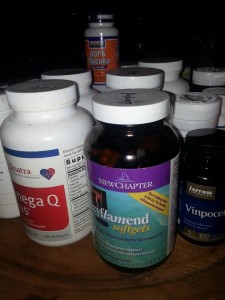 Recently the press was transfixed when NY State Attorney General Eric Schneiderman’s office announced that the vast majority of herbal supplements tested by the AG’s office had none of the herbs claimed. This followed a Canadian Guelph University study from the developers of a novel DNA testing process that claimed a huge percent of herbs tested were bogus. That study was so poorly done that the American Botanical Council asked for it to be retracted. Their title said it all:
Recently the press was transfixed when NY State Attorney General Eric Schneiderman’s office announced that the vast majority of herbal supplements tested by the AG’s office had none of the herbs claimed. This followed a Canadian Guelph University study from the developers of a novel DNA testing process that claimed a huge percent of herbs tested were bogus. That study was so poorly done that the American Botanical Council asked for it to be retracted. Their title said it all:
Science Group Says Article on DNA Barcode Analysis of Herbs Is Flawed, Contains Errors, Creates Confusion, and Should Be Retracted: Methodological Flaws, Statistical Inconsistencies, Taxonomic Confusion, and Unreliable Conclusions Require Paper in BMC Medicine to be Corrected, Revised, and Re-peer-reviewed
Nonetheless the specter of a relatively inexpensive new test in an industry everyone assumes is unregulated was irresistible to the AGs office (and besides everyone knows DNA is scientific!) This new DNA barcode test is different from forensic DNA tests which is what people think of when they hear “DNA test.” Now GNC has signed a premature consent agreement and the AG’s offices in 14 states are planning to follow suit based on technically misleading testing.
As a clinical herbalist for over 25 years and a professor of herbal medicine I need to point out that the press has given a free ride to the validity of new DNA barcode testing which purported to show that 79% of herbs from Target, GNC, Walgreens and Wallmart were adulterated or missing the herb claimed. The high figure should have given the AG’s office pause. Verification including microscopy and validated chemical test methods, like those found in official pharmacopeias for these seven herbs, should have been conducted to confirm the DNA findings.
When the initial 2013 Canadian DNA barcode study came out it was clear that it was oriented to the sales of a testing method and had poor application to prepared herbs. DNA barcoding is less expensive than traditional herbal tests and that of course would be a great new market for the test developers. Raw herbs before extraction can be identified by DNA. It has proven itself with foods where whole plant products are being tested. But the test only tests the presence of DNA. Unless I am growing herbs, the least useful compound is DNA: instead I want to extract the medicinal secondary metabolites, the minerals, polysaccharides, polyphenols, sesqueterpenes and flavonoids.
A typical Chinese formula has 7-9 grams per herb and 5-9 herbs, so say has 50 grams of herbs daily. You would need at least 20 large 400 mg pills- too much, which is why herbs are extracted to find their most medicinally useful components. DNA isn’t one of those and it is usually degraded by extraction. However there is a need to add something like rice flour to keep the powdered extracts from clumping and that doesn’t need to be extracted, so its DNA is present. The DNA barcode test doesn’t test concentration so it looks like the herbal capsule is free of the herb and adulterated when, in fact, it is properly made.
Now encapsulated herbs are perhaps the least effective form since you can’t taste them. (Taste and smell are not merely aesthetic experiences- they engage body feedback systems.) Powders can oxidize rapidly. I wouldn’t buy my herbs from Target, Walmart, Walgreens or GNC. I want higher quality. But it begs credibility that 79% of products were free of the herbs claimed. You can visit wholesale herb markets to see the tonnage of herbs at reasonable prices. GNC is in the business of selling herbs and they need to have a certain level of quality (if only because people like me will bite into the capsules and can taste whether the herb is present.)
So it was not accurate to say that 79% of supplements lacked the herbs claimed, instead 79% did not have DNA present. It might have other medicinally useful constituents from the herb in question, and in fact subsequent industry-standard testing found herbs in all samples. It was not accurate to assume there was substantial adulteration, only that excipients were usually used. Some 90% of herbs are sold in extract form, unlike the foods that work with DNA barcoding.
There is a need for quality control, especially in the bodybuilding and weight-lifting sectors of the industry where ConsumerLab has identified real problems. I do use suppliers of international herbs who use HPLC and heavy metal testing, but I also purchase whole herbs directly from US growers I know, where I can taste and smell the herbs and make my own extracts. The American Botanical Council has been in the forefront of protecting against adulteration, intentional or accidental. The ABC-AHP-NCNPR Botanical Adulterants Program, is being conducted by ABC with the nonprofit American Herbal Pharmacopoeia (AHP) and the NCNPR, a FDA Center of Excellence lab at the University of Mississippi.
GNC couldn’t afford a shadow over their business so signed the consent requirement. They will have ample evidence they used the herbs claimed but are likely to miss the DNA barcoding target unless they add powdered herb to the excipient. But the spotlight will be off by then. By all means make major retailers stand behind their herbs, but do not enshrine a novel DNA test just because it is cheap.

